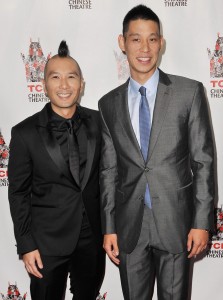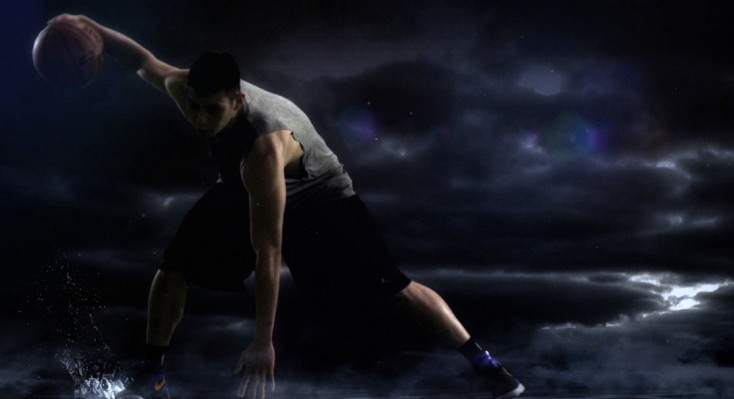
(l-r) Director Evan Jackson Leong with Jeremy Lin at special screening of “Linsanity” held at the TCL Chinese Theatres in Hollywood, CA. ©Front Row Features/Pacific Rim Photo Press.
By ANGELA DAWSON
Front Row Features
HOLLYWOOD—Filmmaker Evan Jackson Leong grew up in the Bay area. An Asian-American, he enjoyed watching basketball, but there were no NBA players that looked like him.
When he started hearing about an up and coming Asian-American on Harvard’s basketball team a few years ago, Leong began to take notice. He saw not only an outstanding player, but also a young man who appeared to be a leader on the court. The player was none other than Jeremy Lin, who in 2012, went on an amazing winning streak that made the world take notice.
But even before “Linsanity,” Leong had started following the young athlete with a camera crew. Initially, reluctant to be filmed, Lin and his very close family eventually warmed to Leong.
The filmmaker had set out simply to document a promising college athlete, but discovered something more as he followed the gifted ballplayer for three years, documenting his triumphs and defeat as he tried to make it into the NBA. After college, Lin was drafted by the Golden State Warriors, the team he watched and admired growing up in Palo Alto, Calif. Although much ado was made about his joining the team, he didn’t get to play very much and was eventually pushed down to the affiliated D-League Reno Bighorns.
A knee injury left him sidelined but the 2011 NBA lockout at the same time allowed him time to heal. He was traded to the Houston Rockets, but that team soon waived him to hire a superstar center. He was then picked up by the New York Knicks, where he didn’t get much of a chance to play until an embarrassing loss to the Boston Celtics on Feb. 3, 2012 convinced coach Mike D’Antoni to put Lin in as a last-ditch attempt to see if he could perform under pressure. In a game against the New Jersey Nets the next night, Lin scored 25 points, with five rebounds and seven assists in a 99-92 victory.
Leong was as astounded as anyone, and more importantly for his film, he figured he finally had a proper ending. Then came another winning game against the Washington Wizards, where Lin scored 23 points with 10 assists, followed by the subsequent victory over the L.A. Lakers, and so on. The rest, as they say, is “Linsanity.” Lin became a restricted free agent at the end of the season and returned to the Rockets, only this time with a $25 million, three-year contract in hand.
The 34-year-old filmmaker, unmistakable for his head-turning Mohawk, says it was difficult not to get caught up in the hoopla surrounding Lin’s meteoric rise to fame. But the central theme of his film, about a phenomenal player who so happened to be Asian-American, remained intact.
“Linsanity,” which opened in theaters in October, is now available on DVD. The 35-year-old filmmaker recently spoke by phone about documenting Lin’s incredible journey.
Q: Was Jeremy as reluctant to participate in the documentary as it shows in the “extras” on the DVD, where he keeps saying “no” to you?
Leong: He probably was even more reluctant than we show him, because we didn’t really know him at that point. He was like, “I don’t want to do this.” From my perspective, he was a great person with a great story and I wanted to tell it. But we didn’t understand his state of mind. He was in his senior year of college. All he wanted to do was train for the NBA. Any other distractions he didn’t want to have. He didn’t feel, at that point, he had done enough to warrant a documentary. Why would he want a camera crew him around? He didn’t feel it was important. To me, what he already had done was a great story.
Q: How did you convince him to let you film him?
Leong: Over time, we kind of hung around. We said, “OK, we don’t have to film you, but our door’s always open.” Chris (Chen), our producer, got close to (the Lin) family. They realized, at the very least, they’d get some great home video footage of him at this moment of his life. And he eventually said, “Let’s shoot.” I think it was just a matter of time to develop trust.
Q: Did he get used to having the camera on him?
Leong: I don’t know. He always was cognizant of it. There were times, where he wanted to relax. But we set up times to shoot.
Q: Was the Lin family influential in making sure that Jeremy was portrayed in a positive light?
Leong: Yeah. There was nothing about him or this story that was going to be negative. We said from the beginning, “this isn’t an expose piece or a racism piece.” We’re trying to tell his story and the journey he was on.
Q: When did you first become aware of him?
Leong: I remember a little bit about his high school championship. I grew up in the Bay Area so I paid attention to the news when he was a star player (at Palo Alto High School), but I already was living in the LA area when that happened. I really got to know about him during his junior year at Harvard. One of biggest things that impressed me about him playing at Harvard was that he wasn’t this 7-foot-6-inch tall guard, or a shooter from the outside. He was a leader. He was the alpha male who controlled the ball. He was very aggressive. I’d never seen anyone at that level have that aggressiveness and also be a role model in basketball.
Q: You didn’t know him personally?
Leong: No.
Q: You traveled with him to Taiwan and mainland China, right?
Leong: Yeah, Jeremy goes to Taiwan and China every year.
Q: How was it filming in Asia?
Leong: It was crazy! It was like the Beatles had arrived. Jeremy represents hope for people in Asia. What he represents in Taiwan and China means a lot because they don’t have a player like that to root for. Before he got on the (Golden State) Warriors, it was pandemonium when he went to Asia. We went before he really blew up and he already was a huge sensation over there. He has an opportunity to bridge the two countries through basketball.
Q: When he was at his lowest point, did he ever ask you to stop rolling? Was he ready to give up?
Leong: Oh yeah. He was ready to give up when he was traded to the Knicks. It was pretty dark at that point. He already had been cut from two teams. The future looked bleak for him. He was pretty depressed. He was depressed in his first year when he was in the D league. It’s the emotional roller coaster that he goes on that pushes him to the limits makes him such a great basketball player. He goes as dark as he can to get as high as he can. It’s in his nature. He wasn’t like (in a pleading voice) “I don’t want to film,” he was like (more firmly), “You’re not filming today.”
Q: When he had that turnaround in February 2012, how did you feel as a filmmaker?
Leong: It was amazing for me. When he finished that first game, I thought, “Great! We have an ending (for the film).” Then, the next game, he gave us another ending, and then another one and then another one. It got way out of hand. My whole life was consumed by Jeremy and all these basketball games. But, yeah, it changed my life too. My career took off from that moment too. Getting to that point, it was just surviving and making it to that point.
Q: NFL quarterback Tim Tebow got a lot of flak for expressing his faith openly on the field. How did Jeremy, who is clearly driven by his faith, avoid being chastised for openly demonstrating his Christian faith?
Leong: The NBA isn’t as blatant (as the NFL). Before every game, they have bible study that players can go to on both teams. There’s always (a religious) element there; it’s just not publicized. Christianity has a certain stigma attached to it. With Jeremy, it seemed important to talk about his faith (in the documentary) because that’s a huge part of who he is. But I also wanted to deliver it and execute in the way that he does it. The way he shares his faith is more by example than by telling it to you. He’ll tell you about it but he won’t throw it in your face. He feels by being a role model, (his message) is more powerful and effective, because people look at him and say, “What is he doing right? I want to know more.” That’s just the kind of person he is and that’s how we wanted to share it in the documentary.
Q: How much did it cost to make this film and how much did you raise through Kickstarter?
Leong: Less than $1 million. When we first started this, it was just going to be a bunch of YouTube webisodes. We had these short clips. We had no budget. We just did it because we thought we had a great story to tell. We did this on the weekends or whenever we had time. I remember I took vacation days from my job at NBC News in New York as a segment producer to go to Taiwan. As we got into it, we discovered we had to get music licenses and other expenses we hadn’t anticipated. We could have gotten investors because a lot of people were interested in Jeremy. But the reason we went to Kickstarter was really more for social engagement—to see if we had a film that people wanted to see it. So we got early supporters involved in the process. Everyone knows that social media is a big part of the game these days. So if we could get people involved early, then the campaign becomes a lot stronger later.
Q: Since the film’s theatrical release, what has been the response?
Leong: It’s exciting for me to see kids watch it. Jeremy means something completely different to them. He is like their Michael Jordan. So it’s a whole other perspective of a role model. I wish I had a Jeremy growing up.
Q: Have you stayed in touch with Jeremy?
Leong: Yeah. We talk all the time. It’s nice because there’s no pressure, like me asking him to do something. We’re just friends now.
Q: What are you working on now?
Leong: I’ve been shooting this other documentary. It’s another Asian-American subject. Her name is Michelle Phan. She’s a YouTube celebrity. It’s completely different in terms of subject matter but it has the same sort themes of the American Dream and following your dream.





